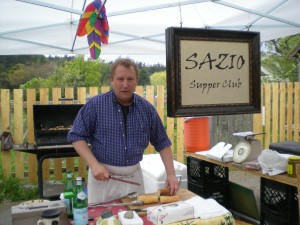By Barbara H. Lewis

Bill Patterson at his booth in the Orcas Island Farmers Market
As a boy, Island Chef Bill Patterson whipped up breakfast for his family, just for the fun of it. He’s been cooking ever since. “I pretty much eat, sleep, and breathe food,” he says.
Patterson believes our memories are intertwined with aromas and flavors. Tastes reflect the stories of our lives. “I remember the first time I ate an avocado, my first peaches-and-cream, my first taste of Rainbow Trout,” he says. His memories of visiting his grandmother in Iowa are connected to the taste of pickled-tongue sandwiches and sweet relish.
Patterson has been cooking professionally for sixteen years. Many Islanders have sampled his four-course meals at Sazio, a dinner club held in the basement of Odd Fellows Hall. Patterson also cooks his specialty sausages at the Orcas Island Farmers’ Market and sells them by the pound. He doesn’t mind sharing the ingredients: pork shoulder, fresh ground garlic, chopped fresh rosemary, fennel seed, pepper flakes, salt and pepper, and a little bit of olive oil. “It’s not what I put in it that’s important, but what I don’t,” he says.
Patterson is big on flavor, and that means cooking with fresh ingredients. He often partners with local farmer Rhonda Barbieri to bring the freshest greens and vegetables to the table. “I’m first in line for Rhonda’s produce because I know what’s in it. Rhonda’s greens are always going to be in-your-face with flavor.”
Barbieri’s memories also include food, but with the emphasis on growing it. “I grew up in my grandmother’s vegetable garden in Arizona, playing among the corn and tomatoes beside her roses and cactuses. On hot days, I used my grandmother’s fig and lemon trees for shade.”
Trained as a clinical herbalist, Barbieri ran an herb store in Flagstaff. She’s also worked in the recreational industry, guiding boat tours down the Colorado River to the Grand Canyon. “I love being outdoors. Farming suits me. It’s like eternally camping.”
These days Barbieri runs an Orcas farm, La Campesina Project. Her mission is to provide fresh produce using sustainable, organic farming methods on borrowed land. She hopes to create a model for other landless farmers. “There’s so much farmland that’s unused on Orcas. It’s nice to get it back in production.”
Patterson and Barbieri share a philosophy of freshness. “There’s no substitute,” says Patterson. “I try to use what’s available because the alternative is unacceptable.” That’s why he depends on Rhonda. “When chefs and growers click, they begin to think alike,” says Barbieri. “Bill will come to the farm and tell me a recipe, and we’ll share his idea creatively.”
Patterson and Barbeiri will partner on May 9 to teach about cooking with local foods in the Parish Hall at Emmanuel Church for Coming to Our Senses, an event that will help raise funds for the 2009 Orcas Island Writers Festival to be held in September. Patterson and Barbeiri believe that cooking with local foods makes a lot of sense. “It’s about reciprocity,” says Barbeiri. “When cooks and farmers use fresh foods, the whole community prospers.”
The Orcas Island Writers Festival has embraced the idea of cooking with fresh food because good writing relies on employing the senses, and what better way to stir up our senses than in the smell and taste of fresh food? “I’m happy to partner with the writer’s festival,” says Patterson, who made the lunches during the festival last year. “We’re going to have a lot of fun with this cooking class.”
Patterson emphasizes technique when he teaches. “There’s no substitute for watching somebody cook right in front of you. Food makes a certain sound when it’s cooking. You can smell food and tell when it’s done. You can’t get that on TV or in a book.” After the cooking class, participants will dine. Patterson serves food in a convivial atmosphere, facilitated by a family-style presentation. “We’re all about creating community,” he says. It’s a goal he shares with the founders of the Orcas Island Writers Festival.
Between the cooking class and dinner, Barbieri will discuss the use of local produce and her vision for the future of farming on Orcas. “We’re shifting,” says Barbeiri. “We’re establishing a more traditional relationship to the land. I hope to see this in my lifetime.” But watching Barbieri work may be the best way to learn about her vision. That’s why class participants will be invited to tour the farm during the following week. They may even get their hands dirty. “We’re trying to connect people to the land,” says Barbeiri. “It’s all about partnership.”
To sign up for “Coming to Our Senses,” contact the Orcas Island Writers Festival at (360) 317-4383 or write festivalgurus@orcasislandwritersfestival.com. You may also register online at www.orcasislandwritersfestival.com.
**If you are reading theOrcasonian for free, thank your fellow islanders. If you would like to support theOrcasonian CLICK HERE to set your modestly-priced, voluntary subscription. Otherwise, no worries; we’re happy to share with you.**






